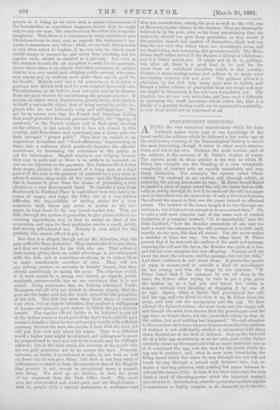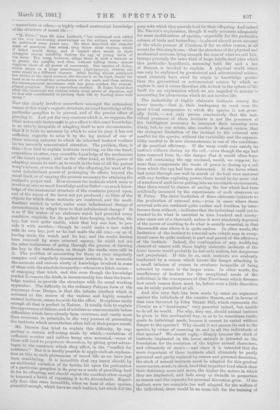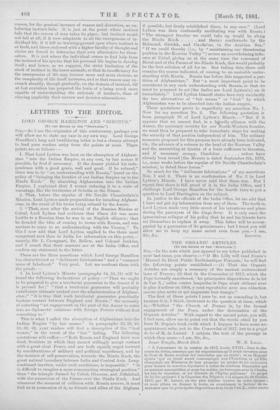INSUFFICIENT INSTINCTS.
A:4.10NG the very numerous contributions which Sir John Lubbock makes every year to our knowledge of the insect world, the address which he delivered. a few weeks ago at the anniversary meeting of the Entomological Society is one of the most interesting, though it refers to other men's observa- tions, and. not to his own. Perhaps the most curious part of the address is the account of M. Fabre's studies of wasps. The curious point in these studies is the way in which M. Fabre has brought out the blending of a very remarkable complexity of instinct with an equally remarkable and very sharp limitation. For example, the species called Chali- codoma " is enclosed in an earthen cell, through which, at maturity, the young insect eats its way. M. Fabro found that if he pasted. a piece of paper round the cell, the insect had no diffi- culty in eating through it ; but if he enclosed. the cell in a paper case, so that there was the space even of only a few lines between the cell and the paper, in that case the paper formed an effectual prison. The instinct of the insect taught it to bite through one enclosure, but it had not wit enough to do so a second time." Or, to take a still more singular case of the same sort of curious limitation of complex instinct, " It is remarkable," says Sir John Lubbock, " how the Bombes remembers (if one may use such a word) the entrance to her cell, covered as it is with sand, exactly, to our eyes, like that all round. Yet she never makes a mistake or loses her way. On the other hand, 111. Fabre proved that if ho removed the surface of the earth and passage, exposing the cell and the larva, the Bembex was quite at a loss, and did not even recognise her own offspring. It seems as if she knew the door, the nursery, and the passage, but not her child." And these instances do not stand alone. A particular species of wasp is accustomed. to provide a kind. of grasshopper for her young, and this she drags by one antenna. " M. Fabre found that if the ant:mum be cut off close to the head, the Sphex, after trying in vain to get a grip, gives the matter up as a bad job, and. leaves her victim in despair, without even thinking of dragging it by ono of its legs. Again, when a Sphex had. provisioned her cell, laid. her egg, and. was about to close it up, M. Fabre drove her away, and. took out the ephippigera and. the egg. He then allowed the Sphex to return ; she went down into the empty cell, and. though she must have known that the grasshopper and the egg were no longer there, yet she proceeded calmly to stop up the orifice, just as if nothing had. happened." We call attention to these curious facts here, because it seems to us thatthe problem of instinct is not sufficiently studied. in connection with these sharp limitations of the field. of instinct. Just as the bird. will sit on a false egg as patiently as on her own, just so this Sphex carefully closes up the empty cell with as much maternal care as if it contained the egg and the food. for the insect which the egg was to produce; and, what is even more remarkable, the living insect which has eaten its way through one cell will not break its way through a second wall, however thin, but re- mains a starving prisoner, with nothing but paper between it- self and. the means of life. In fact, it has then exhausted. the very limited stock of directing-power which the inherited instinct provided for it. Nevertheless, what the particular instinct enjoins is sometimes so highly complex in its character as to involve, —somewhere or other,—a highly refined anatomical knowledge of the structure of insect life
"M. Fribre," says Sir John Lubbock, "has continued and added to the very interesting observations on the solitary wasps which he published some years ago. Ho then described the singular state of paralysis into which they throw their victims, which if killed would decay, and if buried alive would in their struggles almost infallibly destroy the egg or young larva of the wasp. The wasp, however, stings them in such a manner as to pierce the ganglia., end thus, without killing them, almost deprives them of all power of movement. One species of Sphex, which preys on a largo grasshopper (Ephippigerti), obtains the same result in a different manner. After having almost paralysed her victim in the usual manner, she throws it on its back, bonds the head so as to extend the articulation of the neck, and then, seizing the intersegmental membrane with her jaws, crushes tho subcoso- phagal ganglion. Truly a marvellous instinct. M. Pubre found that after this treatment the victims retain seine power of digestion, and lie was able considerably to prolong their life by feeding them with syrup."
Now this clearly involves somewhere amongst the antecedent causes of this wasp's organic structure, an exact knowledge of the particular ganglion to be pierced, and of the precise effect of Piercing it. And yet the very creature which is, we suppose, the blind automatic instrument to give effect to this exact knowledge, is so utterly incapable of adapting itself to new circumstances, that if it finds no autenum by which to seize its prey, it has not sufficient sagacity to seize it by the leg instead of one of those missing antenna) to which its inherited instinct confines its too narrowly concentrated attention. The problem, then, is this,—how best to explain instincts involving, ou the one hand, somewhere or other, very recondite knowledge of the mechanism of the insect system ; and on the other hand, so little power of adapting means to ends, as to result in the loss of all the parent wasp's labour, or even the death of the offspring, for want of the most infinitesimal power of prolonging its efforts beyond the -usual limit, or of varying the process necessary for attaining the instinct's proper end. How account for instincts which seem to involve at once so much knowledge and so little ?—so much know- ledge of the anatomical structure of the creatures preyed upon, and of the wants of the larva not yet produced ; so little of the objects for which these instincts are conferred, and the modi- fications needed, in order, -under some infinitesimal change of circumstances, to adapt them to that infinitesimal change ? It is as if the maker of an elaborate watch had provided every condition requisite for its perfect time-keeping, including the key, but were quite unable, when that key was lost, to pro- vide it with another,—though he could make a new watch with its own key, just as he had made the old one ;—or as if, having made the watch and its key, and the works having been removed by some external agency, he could not see the utter uselessness of going through the process of turning the key in the watch-case, as though the works were still in it. The problem of accounting for these at once singularly complex and singularly incompetent instincts, is to reconcile the accurate and curious nicety of knowledge involved in some of them with the absolute incapacity—whenever a hitch occurs— of removing that bitch, and this even though the knowledge needed to remove the hitch, is immeasurably less than the know- ledge needed to provide the structure with its usual working apparatus. The difficulty in the ordinary Paleyan form of the argument from Design, is that the infinite intellect which is assumed as the source of the various and highly complex animal instincts, seems too wide for the effect. It explains easily enough all that is perfect in Nature, It totally fails to explain the appearance of failure, and of a failure so unaccountable before difficulties which have already been overcome, and vastly more than overcome in principle,in the very process of generating the instincts which nevertheless often fail of their proper result.
Mr. Darwin has tried to explain this difficulty, by sug- gesting a certain self-acting mode by which,—variations of sufficient number and calibre being once assumed,—some of them will tend to perpetuate themselves, by giving groat advan- tages to the creatures which they affect, in the " conflict for existence." But it is hardly possible to apply such an explana- tion as this to such phenomena of insect life as we have just been considering. It is incredible that any insect should, by an accidental variation of its habits, hit upon the perforation of a particular ganglion in its prey as a mode of providing food fit for its offspring, and should repeat the accident often enough to transmit a habit of repeating it to its descendants. Especi- ally does this seem incredible, when we hear of other species, plentiful enough, which have no such instinct, but which kill the prey with which they provide food for their offspring. And indeed Mr. Darwin's explanation, though it really accounts adequately for some modifications of species,—especially for the protective colours of birds and butterflies,—is .almost absurd as an account of the whole process of Creation, if for no other reason, at all events for this simple one,—that the structure of the physical and mechanical universe, lying beneath the zone of what we call Life, betrays precisely the same kind of large intellectual plan which this particular hypothesis, assuming both life and a law of descent, is invoked to explain. A physical world which can only be explained by geometrical and astronomical science, must certainly have owed its origin to knowledge greater than the geometrical or astronomical science by which we explain it, and it seems therefore idle to look in the sphere of life itself for an explanation which we are impelled to assume in accounting for phenomena which do not involve life.
The inelasticity of highly elaborate instincts among the lower insects,—that is, their inadequacy to meet even the most trivial emergencies to which the species is not gener- ally liable, — not only proves conclusively that the indi- vidual possessor of these instincts is not the possessor of the intelligence necessary to interpret their meaning even dimly, but, to our minds, also renders it almost certain that the stringent limitation of the instinct to the external acts needful for the species, without the variability and the expansi- bility needful to fit new circumstances, is one of the conditions
of its practical efficiency. If the wasp could ever satisfy its instinct without closing up the cell,—even though the egg had been removed from it,—the danger that it would often leave the cell containing the egg unclosed, would, we suppose, far more than compensate the waste of power in closing up a cell from which the egg had been abstracted, if the larva which had eaten through one wall in search of its food were endowed with any further exploring power, there would be far more risk of numbers of such larvae getting into an unsuitable environment, than there would be chance of saving the few which had been artificially immured by the experiments of such observers as M, Puke. The strict limitation of these elaborate instincts to the production of external acts,—even iu cases where these external acts are rendered quite useless and fruitless by inter- ference from without,—indicates that the individual could not be trusted to do what is essential in nine hundred and ninety- nine cases out of a thousand, unless it were absolutely deprived of the power of omitting to do what is usually essential, in that thousandth case where it is quite useless. In other words, the limitation of the instinct to external acts (which may in excep- tional cases be quite useless), is part and parcel of the efficiency of the instinct. Indeed, the combination of any modifying element of reason with these highly elaborate instincts of the lower insects would probably be not only useless, bat dangerous and prejudicial. If this be so, such instincts are evidently implanted by a reason which knows the danger attaching to a small infusion of reason in creatures incapable of being actuated by reason in the larger sense. In other words, the insufficiency of instinct for the exceptional needs of the individual, is the consequence of that Providence which foresees how much reason there must be, before even a little discretion can be safely permitted at all.
And this very fact has been made by some an argument against the infinitude of the creative Reason, and in favour of that view favoured by John Stuart Mill, which represents the Creator as a " demiurgus," very powerful indeed, but unable to do all he would, For why, they say, should animal instinct be given in this mechanical way, so as to be sometimes inade- quate to individual needs, because it cannot be varied without danger to the species P Why should it not ensure its end to the species, by virtue of ensuring its end to all the individuals of that species ? We should reply,—Simply because the stock of instincts implanted in the lower animals is intended as the foundation for the evolution of the higher animal characters, and ultimately of man's :—and since it is intended that the more important of these instincts shall ultimately be partly governed and partly replaced by reason and personal discretion, the stock of animal instincts must be adapted for this gradual supersession, must, in short, be of that imperfect kind which show their deficiency more and more, the higher the nature in which they are implanted, and fade away or dwindle in proportion as reason and the capacity for personal discretion grow. If the instinct were too complete, too well adapted. for the welfare of the individual, there would be no room left for the training of
reason, for the gradual increase of reason and discretion, as un- faltering instinct fails. It is just at the point where instinct fails that the reason of man takes its place ; but instinct would not fail at all, if it were adaptable to all the emergencies of in- dividual life, if it left no training-ground open where instinct is at fault, and those endowed with a higher faculty of thought and choice are forced to determine their own alternative for them- selves. It is just where the individual ceases to find help from the instinct of his species that his personal life begins to develop itself ; and hence, as we suppose, the strict limitation of the stock of instinct in the lower animals, so that its insufficiency for the emergencies of life may become more and more obvious, as the complexity of life itself increases, and so that reason may en- croach steadily, though gradually, on the domain of instinct, till at last evolution has prepared the brain of a being much more capable of understanding the rationale of instincts, than of obeying implicitly their narrow and decisive admonitions.




































 Previous page
Previous page